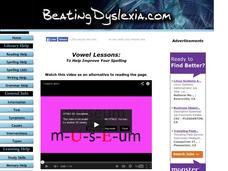Curated OER
Fishing for F
Students recognize the phoneme /f/. Through matching activities, students discriminate the phoneme /f/ from other letters and phonemes. They associate the phoneme /f/ with its letter representation and identify the phoneme /f/ in various...
Curated OER
TH - That's the Truth!
Students identify the digraph /th/ in written and spoken language. After a brief discussion the independent and combined sounds of the phonemes /t/ and /h/ students practice identifying initial and final placement of the new sound /th/...
Curated OER
Hurry Home, Henry!
Students practice letter recognition of /h/ in spoken and written words. They listen for the phoneme, repeat it and participate in meaningful hands-on activities to help master the letter H. Students encounter the book, "Hungry Harry,"...
Curated OER
Mysterious E: Makes Space a Brave Place
Students complete a variety of activities related to the long /a/ sound and words containing a_e. In small groups they play a board game, then spell words containing the a_e letter pattern using letter manipulatives. Students read the...
Curated OER
L Blends
For this reading worksheet, students match 12 words with their pictures. All words contain the letter L as their second letter (blocks, glass, etc.)
Curated OER
That Sneaky E!!
Introduce your class to the concept of vowel digraphs. They identify the digraph /ea/ in spoken language. After a brief discussion, they apply the rule for identifying and spelling words containing the /ea/ digraph. Because the...
Curated OER
Alphabet Books
Students explore alphabetic principle and phonemic awareness by making alphabet books. They identify initial consonant sounds and choose pictures of objects that begin with given letters of the alphabet. Students identify phonemes...
Curated OER
Bum, Bum, Beat the Drum
Students experience practicing sorting words and pictures to build letter and sound recognition. They identify /b/ in spoken words and learn how to write the graphemic representation of /b/. Each student also practices with the tongue...
Curated OER
Blends with R as the Second Letter
Young scholars listen to a text in class and determine which words the blend with an "r" as a second letter. They practice the blend.
Curated OER
Blending Buddies
Young scholars put word cards together and use the word parts to create correct words. In this phonics lesson plan, students practice pronouncing consonant blends and vowel sounds, demonstrating an awareness of beginning, middle, and...
Curated OER
Shake With A
Use letter boxes and letter tiles (d,a,y,l,p,w,k,f,r,i,t,s,b,c,I) to help your class distinguish between the sounds for short vowel a and long vowel a. They are introduced to the vowel patterns that comprise long vowel sounds, with a...
Curated OER
Reintroduce /au/
Practice decoding au words with your first and second graders. They state the sound of au when the teacher points to the corresponding letter combination, and remain silent when any other letter combination is displayed. Complete...
Curated OER
Initial Blends with L as the Second Letter
Students listen to and read the poem "Cat's Eyes" and discuss the repetition of words and the blends in the poem.
Curated OER
Kindergarten Phonics
Students are introduced to the letters and phonemes for C, L, N, P, T, and A. They identify each letter in its upper and lowercase forms. Students differentiate the letters from each other and practice identifying objects and pictures...
Curated OER
Don't Make that Baby Cry
Learners study the short "a" sound in words by examining the mouth movements made when making the sound. They practice making the sound by pretending they are making baby sounds. Next, they recite a tongue twister that contains a number...
Curated OER
Phonics Help: The Phonic Alphabetic Code Chart
Phonics is a fundamental key to reading success. To help your learners with dyslexia or learning disabilities, try using the phonic alphabetic code chart. The chart and full instructions on how it can be used in the classroom are...
Curated OER
See It, Say It, Move It, Do It!
Learn two new letters a week with this activity! After learning the two target letters, the class will make an alphabet video "performing" each letter. The letter's name, sound, and a motion associated with it will be included in the...
Curated OER
Vowel Lessons: To Help Improve Spelling
There are a few things every good speller knows: spelling rules, vowel sounds, and word endings. Help your learner with dyslexia become a more efficient speller with a few tips from a dyslexia expert. Included in the lesson is a video,...
Curated OER
Iggy is Icky Sticky
Second graders explore short vowels and their help in the development of phonemic awareness. They gain experience of the correspondence /i/. Students illustrate the correspondence by using memorable techniques used in showing /i/ in...
Curated OER
Beginning Sounds-What sound does each picture begin with?
Students view a multimedia presentation to identify beginning sounds. In this phonics lesson, students recognize beginning sounds. Students navigate a website for addition phonics sounds.
Curated OER
Letter M: Initial Sounds
In this letter M activity worksheet, students examine 12 pictures of various objects and identify the pictures of the items that begin with the letter M. A word bank is provided.
Curated OER
Letter B: Initial Sounds
In this letter B activity worksheet, students examine 12 pictures of various objects and identify the pictures of the items that begin with the letter B. A word bank is provided.
Curated OER
Icky Fingers
Which i sound is used in the word icky? Kindergarteners and first graders listen to the short /i/ sound. They practice shaking their fingers to indicate icky when they hear the target sound. Then they practice reading a poster with the...
Curated OER
OW! I stubbed by toe
Drill and practice the /ow/ sound! Kids practice recognizing pictures that begin with the ou=/ou/ correspondence. They experience a letterbox lesson to help implement this task before them as well as reading the story, The Napping House,...

























